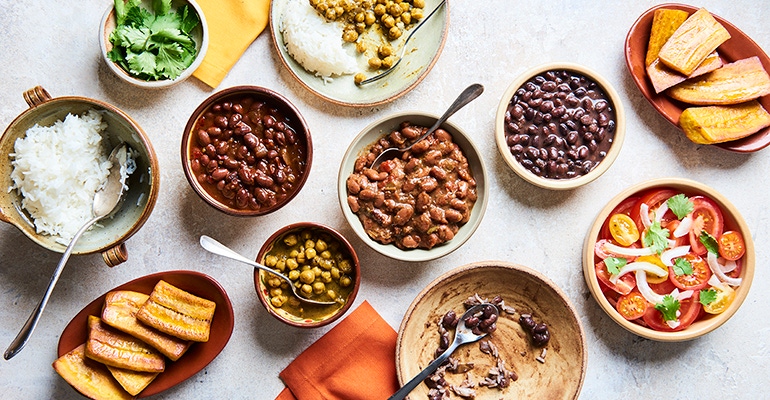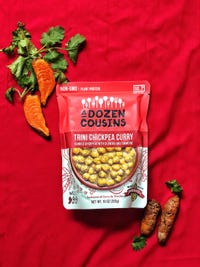The NEXTY Award-winning brand is bringing some much-needed innovation to the bean category.
July 22, 2019

A Dozen Cousins won a NEXTY award for Best New Pantry product at Natural Products Expo West just a couple months after the company’s debut. It sells ready-to-eat beans seasoned with global flavors; the product line currently includes Cuban Black Beans, Trini Chickpea Curry, and Mexican Cowboy Beans. We talked with founder Ibraheem Basir about his inspiration for the brand, the industry gap he’s working to fill and the potential of food to drive social impact in the communities that motivated him to develop the products in the first place.

You’ve communicated your brand as one that has a social mission at its core. When food brands talk about social change, though, they often focus on sourcing arrangements, or how they spend their profits. A Dozen Cousins is different. Can you talk about the goals your brand is setting out to achieve, and how food can be used to impact communities and drive social-minded mission?
I had been working in the natural products space for awhile before I started A Dozen Cousins. I grew up in Brooklyn, in a predominantly black and Latino working class community. A lot of the messages and the products in the natural products space, many of them didn’t resonate with me. They didn’t necessarily speak my language, they didn’t reference the same cultural points. The approach to food in many cases felt very different, in many cases nutrition- or performance-focused, versus for us, food was really more around taste and culture.
One of the beliefs I had when I started the brand was that we could get way more people involved in the natural products space, a much more diverse slice of the population, if we were creating brands and products that reflected their cultural experiences with food. In some cases, that’s very literal—we make food that is Creole, Caribbean, Latin American, in which case it refers very specifically to their kind of heritage. But also in terms of the more informal ways that people think about food—as a way for family to get together, or as a way to celebrate holidays or mark milestones. My belief is that if you have brands that kind of match people’s food culture and food beliefs, it makes it more likely, easier for them to adopt healthier eating habits.
Our mission at the end of the day is to get more people eating healthier, living healthier, regardless of who they are, what they look like, how much money they earn or what their background is.
How do you plan to do that?
The industry [currently attracts] a largely homogenous, high-income, high-education slice of the population. That’s changing each year, but we’re certainly not there yet. Our mission is to get the people who are eating and living healthy to look as diverse and as reflective of the American population as possible
We think we can do that through two ways. One is through the product itself, and the second is by proactively supporting organizations that are working to combat those socioeconomic health challenges. Early on in our brand journey, it became clear to me that we wouldn’t be able to do it all through just the product. We can reach people who might be predisposed to eat healthier, who maybe have the income to do so, but there’s still going to be a good chunk of the population that isn’t there yet; either they don’t value healthy eating, they don’t have the income to support it, it’s not available at the places where they shop. That’s why we created this social impact grant to help support organizations that are combating some of the socioeconomic health issues we see in this space.
In the U.S., if you are black, brown or poor, you’re much more likely to suffer from a food-related illness, whether that’s obesity, diabetes, high blood pressure, hypertension. There’s a lot of drivers, but the end result is you have these communities that suffer disproportionately with their health and we felt like we could help combat that.
Does the natural foods industry have a problem of racism to confront? Or what is the reason for this absence of products appealing to black and Latino communities?
I don’t think it’s racism. If you’re a founder or an entrepreneur, you ultimately build products to solve the problems that you have, and you build solutions that resonate with you. It makes sense to me that the industry is reflective of the people who started it. If you’re an athlete, you have problems related to athletic performance and you build solutions other athletes will love.
What we haven’t had historically is a ton of diverse entrepreneurs identifying the issues of our communities and building solutions. That to me is the root driver. I don't think it’s any malicious intent by anyone in the industry; in fact, it’s probably one of the most high-integrity, mission-driven industries I’ve ever worked in or been a part of. No knocks there.
I wanted to have a brand that resonated with me the way and that I could love in the same way that I saw many of my peers had. If you ride bikes, you love the Clif brand in a way that is super clear. If you’re a mom and you have a young kid, the Annie’s brand resonates with you in a meaningful way. It speaks to your soul. I wanted a brand that could do the same thing for people from these places. And I don’t claim to speak for all black and Latino consumers. It’s a very diverse group of people and there’s a lot of subcultures and nationalities represented within it. But I do think there are some overarching themes in terms of the way that we approach food and family and joy that I don’t think you necessarily see in the industry at a large scale.
What was th e significance of the NEXTY award for A Dozen Cousins?
e significance of the NEXTY award for A Dozen Cousins?
First and foremost, I think it was just a huge stamp of approval for the work that we’ve done. It generates a certain amount of buzz and traffic around the brand. Even during Expo West, we had retailers stop by, compliment on us on being nominated, we had people coming by and congratulate us on winning. It just kind of helped increase the visibility of the brand.
Even since then, it’s given us credibility as we go and sell to retailers. If you’re a buyer at a grocery store, you’re getting hit with hundreds of products in a given month, and looking for ways, I think, to cut through the crowd sometimes. The award has been helpful for us In that way, in that it puts us at or near the top of the line of products they want to check out.
National Coop Grocers was the first to bring us in, and we’re in a few hundred natural channel retailers throughout the country.
Do you have any specific distribution strategy to try to reach your target communities?
To start, we’re focused on the natural channel. We’ve come to terms with the fact that there’s a certain percentage of the world we’ll be able to reach through our product. The hope is that as the brand grows, we’ll be able to continue to increase the audience we’re speaking to. We still do need to take it one step at a time.
As we launch, we have really three audiences that we're focusing on: vegan and vegetarian consumers, seeking convenient plant-based proteins; a group we call flavor explorers, who just love global foods, regardless of their background; and black and Latino millennials.
We don’t out the gate think that we're going to reach low-income consumers through this initial product. It’s just not practical. But we have plans over time, but through our social impact work and through our growth as a brand, to eventually reach those consumers in more meaningful ways.
Is there anything else about how you recognized the opportunity here that you think is different from a typical natural food product launch?
A lot of times in the natural products space, there’s a really disproportionate focus on large, growing categories, or things that are on trend. Beans don't necessarily fit that profile. It’s a big, mature category; there’s not a ton of innovation. But I think it’s a space where innovation is needed. If you just think about what’s out there today, you have dry beans, canned beans, and some seasoned beans but they’re pretty low-quality in terms of ingredients. Our point of view is that we could bring innovation to this category through taste, convenience, high-quality ingredients. But it’s not a category where you see hundreds of new brands. It’s something that people bring up a lot — beans aren’t a sexy category, but they’re something that there’s a huge audience for, there’s people who love them, and there’s pretty limited innovation in the space.
What can we expect from A Dozen Cousins in the future?
We have a pretty clear vision for the brand over time, and that is to be a meal brand that represents authentic Creole, Caribbean and Latin American foods. If you fast forward five or 10 years into the future, what we would love is that a person can assemble an entire meal from the products we make.
Dinner time is a really emotional mealtime. It’s a time when people come together with their family, when people want to pass on their own culture and tradition, when people want to put something healthy on the table for their family. But there’s also the very real challenge that most people don’t have a lot of time to do that. We feel like as a brand, we can help solve that for people.
About the Author(s)
You May Also Like




